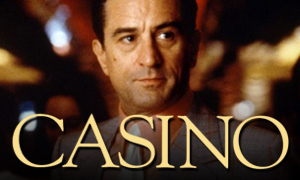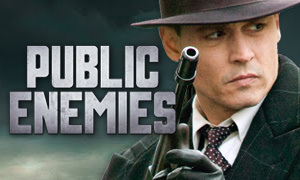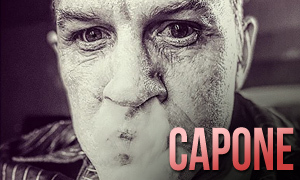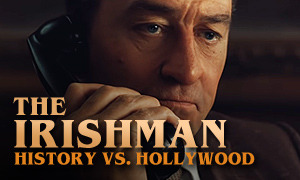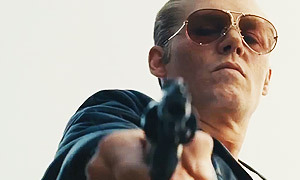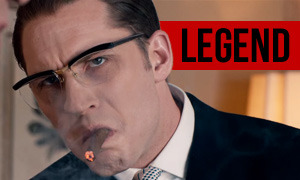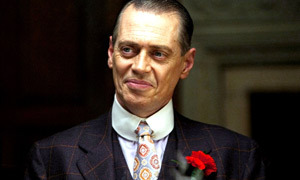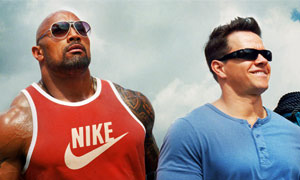American Gangster: History vs. Hollywood
| REEL FACE: | REAL FACE: |
Denzel Washington
Born: December 28, 1954 Birthplace: Mount Vernon, New York, USA | Frank Lucas
Born: September 9, 1930 Birthplace: Lenoir County, North Carolina, USA |
Russell Crowe
Born: April 7, 1964 Birthplace: Wellington, North Island, New Zealand | Richie Roberts
Born: June 23, 1929 Birthplace: Newark, New Jersey, USA |
Lymari Nadal
Born: February 11, 1978 Birthplace: Ponce, Puerto Rico | Julie Lucas
Birthplace: Puerto Rico |
Cuba Gooding Jr.
Born: January 2, 1968 Birthplace: The Bronx, New York, USA | Nicky Barnes
Born: October 15, 1933 Birthplace: Harlem, New York, USA |
Did Frank Lucas's mentor, Bumpy Johnson, really die in an appliance store?

Was Frank Lucas present when Bumpy Johnson died?
The real Frank Lucas said that he and Ellsworth "Bumpy" Johnson were at Wells Restaurant when "Bumpy just started shaking and fell over" (New York Magazine). Bumpy's widow, Mayme Johnson, also stated that Bumpy's heart attack occurred while he was dining at Wells Restaurant, but she said that he was not with Frank Lucas. She said that Bumpy passed away in the arms of his childhood friend, Junie Byrd. Mayme Johnson does not plan to see the movie American Gangster. "I don't want to see it because it's not true," she said in a 2007 interview. "Frank was nowhere around. Bumpy did not die with Frank Lucas. All of his talk is lies." -Philadelphia Daily News
Was Frank really Bumpy Johnson's driver for 15 years?
No. In the movie American Gangster, Denzel Washington's Frank Lucas states that he had been Bumpy Johnson's driver for 15 years. In an interview, Bumpy's widow, Mayme Johnson, said, "Bumpy never had nobody drive him for 15 years." She admitted that Frank may have driven her husband a few times, but she said that her husband never saw Frank as anything more than someone he might have allowed to carry his coat. Former Philadelphia Inquirer reporter Karen E. Quinones, points out in her book Harlem Godfather that Bumpy was released from prison in 1963 and died in 1968, leaving only a possible window of five years that Frank Lucas could have been Bumpy's driver. Bumpy had never been out of prison for fifteen years. -Philadelphia Daily News
Did detective Richie Roberts really turn in $1,000,000 in drug money?
Yes. In an interview, the real Richie Roberts said that he did get some heat for turning in the money, but he didn't become a "pariah" around his fellow officers like he does in the movie. -HOT 97 FM
Did detective Richie Roberts' partner really become a junkie?
"One of my partners did, yeah," said the real life Richie Roberts. -HOT 97 FM
Did Frank Lucas' wife really buy him the fur coat and hat?
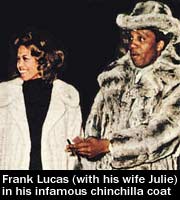
Did the fur coat really give him away?
"No," Richie Roberts said in an interview. "Law enforcement knew of him. Frank doesn't believe that, but law enforcement certainly knew of him and his people. But certainly it brought a lot more attention onto him, that coat. You don't go around showing that kind of money when the people who are trying to arrest you are making in those days $25,000 a year, and you're showing a coat that's like five years salaries. It gets these guys a little angry. So, it was a bad mistake" (HOT 97 FM). Specifically, Richie is speaking of the flamboyant mistake that Frank made when he wore the chinchilla coat and hat to the March 8, 1971 Frazier vs. Ali fight at Madison Square Garden. The above picture of Frank Lucas and his wife Julie was taken on the night of the fight. The detectives in attendance noticed Frank, whose seats were closer than those of the Italian Mafia (BET, American Gangster series).
Did Frank really prefer to stay out of the limelight?
In a documentary about rival gangster Nicky Barnes (Cuba Gooding Jr. in the movie), titled Mr. Untouchable, the real Nicky Barnes said that Frank was actually the more flamboyant of the two of them. The real Frank Lucas responded to Nicky's accusation in an MTV interview, "Nicky was a flamboyant guy, who was kind of live. He would jump out of cars and beat up junkies and all kinds of foolishness. I didn't like that. I tried to stay out of the limelight" (MTV.com). Nicky Barnes displayed his flamboyancy for everyone to see when he appeared on the cover of The New York Times Magazine in his notorious goggle-like Gucci glasses, boasting that he was "Mr. Untouchable." Nicky's bold declaration got the attention of President Jimmy Carter, who insisted that something be done about the dope problem in Harlem (New York Magazine).
Did Frank really smuggle heroin from Vietnam in the coffins of dead servicemen?

Did Lucas really visit the poppy fields and meet with his Southeast Asian supplier directly?
Former heroin dealer Frank Lucas said that this is true. He met with a Chinese man who went by the alias 007. The man took Lucas upcountry to the Golden Triangle, a poppy-growing region where Thailand, Burma, and Laos merge together (New York Magazine). Frank saw endless fields of opium poppies.  See poppy fields and opium poppies close-up. These poppies are used to make heroin, a semi-synthetic opioid synthesized from morphine.
See poppy fields and opium poppies close-up. These poppies are used to make heroin, a semi-synthetic opioid synthesized from morphine.
Did Frank Lucas really dress in a U.S. Army uniform to blend in when he was overseas?
In the movie, Denzel Washington's Frank Lucas is seen dressed in an Army uniform when he is in Southeast Asia. According to the real Frank Lucas, he would dress up as a lieutenant colonel. "You should have seen me -- I could really salute." -New York Magazine
Did Frank really recruit the help of his brothers and cousins from North Carolina?
Yes. This part of the movie is true. Emerging drug kingpin Frank Lucas recruited the help of family members, and he moved them to New York from rural North Carolina. Frank's five younger brothers who worked with him became known as the Country Boys. In an interview, Frank Lucas explained his strategy of recruiting his rural relatives into his business, "A country boy, you can give him any amount of money. His wife and kids might be hungry, and he'll never touch your stuff until he checks with you. City boys ain't like that. A city boy will take your last dime, look you in the face, and swear he ain't got it. ... You don't want a city boy -- the sonofabitch is just no good." -New York Magazine
Did Frank really witness the police murder his cousin when he was a boy?
At the end of the movie American Gangster, Denzel Washington's character tells Richie Roberts (Russell Crowe) about how when he was a 6-year-old boy, he watched his 12-year-old cousin get shot in the mouth by the police, who had tied him to a pole. The true story behind this incident involved members of the Ku Klux Klan, not the police. Frank said that the Klan came to his house, which was located in the back woods near La Grange, North Carolina. They accused his brother of eyeballing a white girl, who was walking down the street. "They took ropes on each hand, pulled them tight in opposite directions. Then they shoved a shotgun in Obadiah's mouth and pulled the trigger." Frank said that this moment caused him to begin his life of crime (New York Magazine). "They crossed the line. Now everything is a fair game now" (BET, American Gangster). Ron Chepesiuk, author of Superfly: The True, Untold Story of Frank Lucas, American Gangster, said that he has found no evidence that Frank had a cousin murdered by the Ku Klux Klan (The Chicago Syndicate).
Was Frank Lucas' wife Julie really a former Miss Puerto Rico?

Did Frank really shoot a rival drug dealer on a crowded sidewalk?
Yes, although Frank has since retracted his account of the incident, which first appeared in Mark Jacobson's 2000 New York Magazine article "The Return of Superfly." In a powerful scene in the movie American Gangster, Frank Lucas (Denzel Washington) shoots a rival drug dealer in the head in broad daylight on a crowded sidewalk. Frank's original account of the incident was similar, except that his brothers weren't watching like they are in the movie, and he didn't return to eat with them within a stones throw of the murder scene.
In real life, the gangster's name was Tango, a 270-pound bald-headed character who was quick on his feet. "Everyone was scared of him," Frank told Jacobson in 2000. "So I figured, Tango, you're my man." Frank confronted Tango and asked him for money that Tango owed him. Tango cursed at Frank. Unlike in the movie, Tango "broke" for Frank, prompting Frank to shoot him four times. "...bam, bam, bam, bam," Frank recounted. "The boy didn't have no head. The whole sh@t blowed out back there ... That was my real initiation fee into taking over completely down here. Because I killed the badest motherf*@ker. Not just in Harlem but in the world." Lucas has since denied the murder. He was never charged (The Atlanta Journal-Constitution).
Was Frank's Blue Magic "brand" of dope really 100% pure?
Not exactly. The movie asserts that Frank Lucas' heroin, Blue Magic, was 100 percent pure. In reality, it was 98 percent pure when it arrived from Southeast Asia. Frank then cut it with "60 percent mannite and 40 percent quinine." This resulted in a product that was only 10 percent pure when it hit the streets. However, this was much better than the rival "brands," which were lucky to be at 5 percent purity (New York Magazine). Addicts who were used to heroin that was only 1 to 3 percent pure often wound up dead after using Frank Lucas' Blue Magic, which was much stronger. Frank had to cut down a little bit on the quality in order to keep his customers alive (BET, American Gangster series).
Did Frank really use naked women to cut his dope?
Yes. According to heroin dealer Frank Lucas, he employed 10 to 12 women who were naked, except for surgical masks. A petite, ruby-haired woman nicknamed Red Top was in charge. -New York Magazine
How much money was Frank Lucas earning at the height of his dope operation?
In the 2000 interview with New York Magazine, Frank claimed that he cleared $1 million a day selling drugs on 116th street. He claims that he once had "something like $52 million," which was mostly in Cayman Islands banks. In addition, he had "maybe 1,000 keys of dope on hand," which was worth no less than $300,000 per kilo. -New York Magazine
Was Frank Lucas a family man as shown in the movie?
The real detective Richie Roberts (now an attorney) told the New York Post, "The parts in the movie that depict Frank as a family man are ludicrous. They did it for dramatic purposes, you know, to make him look good and me look bad." Roberts called the American Gangster scene that shows drug kingpin Frank Lucas (Denzel Washington) holding hands with his family during a Thanksgiving prayer "sickening."  View a photo of Frank Lucas sharing a meal with his family.
View a photo of Frank Lucas sharing a meal with his family.
Did Frank and his wife have a child not shown in the movie?

 View a picture of Frank Lucas with baby Francine and wife Julie (1972).
View a picture of Frank Lucas with baby Francine and wife Julie (1972).Several months after her father was released, Francine found herself on a trip to Las Vegas with her mother. Unbeknownst to Francine, her mother Julie was there to help with a drug deal. The FBI busted Julie and she served four and a half years in prison. Frank was sentenced to seven years (Glamour). Francine returned to Puerto Rico to live with Julie's parents, where she eventually graduated college after attending the University of Puerto Rico. She returned to the United States in 1996 as an Olympics volunteer in Atlanta. After visiting the set of the movie American Gangster, Francine decided to create a web-based organization that she named YellowBrickRoads.org. The organization is dedicated to offering support and advice to kids with incarcerated parents (The Atlanta Journal-Constitution). Frank has a total of seven children (Charlie Rose).
Did Frank Lucas' wife really ask him to come clean and leave the dope business?
Yes. In the movie, drug kingpin Frank Lucas (Denzel Washington) is asked by his wife Eva (Lymari Nadal) to give up his heroin operation. When asked if his wife requested this of him in real life, Frank Lucas said, "Very much so. ... That was true." -HOT 97 FM
Was Detective Richie Roberts really in a custody battle with his first wife?
No. The movie American Gangster shows Richie Roberts and his first wife in a custody battle that ends with Richie admitting that he is a failure as a father. In reality, Richie Roberts and his first wife did not have a child together. Richie told the New York Post that the movie's depiction of his relationship with his first wife is offensive.
Did Richie Roberts really sleep with as many women as the movie implies?
"During that period of time I was not always married," Richie said. "I was divorced and single. And there was still a lot of leftover from the crazy sixties. You know, sexual freedom. And I didn't do anything differently than anybody else did at that time." -HOT 97 FM
Was Frank really connected to famous people?
Yes. In the movie, we see American gangster Frank Lucas (Denzel Washington) connecting with celebrities at a boxing match. In real life, Frank was especially good friends with the heavyweight champ Joe Louis. Frank once paid off a $50,000 tax lien for the champ, who would later appear almost every day at Frank's various trials. -New York Magazine
I heard that Frank was friends with Puff Daddy's father. Is that true?

Was Puff Daddy's father a gangster like Frank?
In an interview with Miss Jones on HOT 97 FM, Frank said that Sean Combs' father, Melvin, was a gangster on the same level as him. He told Miss Jones' radio audience that he once paid the police $36,000 to get Melvin Combs out of jail. That was in addition to giving up the key of cocaine that the police had confiscated from Melvin.
Did corrupt cops really try to extort Frank?
Yes. In an interview, Frank Lucas said that he was extorted by corrupt cops who took over $200,000 a week (HOT 97 FM). These officers were part of the NYPD's Special Investigations Unit. By 1977, 52 out of the 70 officers who had been assigned to the unit were either in jail or under indictment (New York Magazine).
Did Frank Lucas really blow up a dirty cop's car?
Frank responded to this question by saying, "I'm gonna tell you right now. Yes the hell I did blow it up." -HOT 97 FM
Did a corrupt cop really find several keys of dope in Lucas' trunk?
In an interview, Frank said that this really happened, but that he did not pay the cop off in the street as shown in the movie American Gangster. Instead, the detective took Lucas to the station house, where Lucas agreed to pay the detective "30 grand and two keys." -New York Magazine
Did a crooked cop really find money that Frank buried under his pet's doghouse?
No. "I never buried no money at my house," Frank explained when asked about the scene in American Gangster. In the movie, a crooked cop finds money that is buried under a doghouse at Denzel Washington's character's home. -HOT 97 FM
Did Frank's cousin really turn informant on him?
Yes. The movie American Gangster shows a family member of Frank's turning on him and working with the police to bring him down. In an interview, Richie Roberts said that this is true. "It was a cousin. We had three detectives who really spearheaded our investigation: Jones, Spearman, and Abruzzo. ... We helped them flip a cousin who was an informant. ... He testified during the trial." -HOT 97 FM
Did Richie Roberts really arrest Frank Lucas as he walked out of church?
No. The real Richie Roberts called it a "wonderful scene," but admitted that it didn't go down that way (HOT 97 FM). Both Frank and his wife Julie were arrested during the raid on their Teaneck, NJ home. Julie Lucas served time in prison for throwing suitcases full of money out of their bathroom window.
Was Richie Roberts really responsible for bringing down Frank Lucas?

These detectives included ex-New Jersey cops Ed Jones, Al Spearman and Ben Abruzzo. "We spent nearly two years risking our lives on that case, and then we see a guy who had no interest before we made the arrests take the credit. We're angry," said Jones. -United Press International
Where exactly was Frank Lucas' home in Teaneck, New Jersey?
Heroin dealer Frank Lucas' early 1970s home was located at 933 Sheffield Road in Teaneck, New Jersey. It is believed to be the house that is slightly southeast of the pointer on this map (  See Google Map).
See Google Map).
Did the dirty cop really blow his brains out like in the movie?
No. In the movie, Detective Trupo (Josh Brolin) kills himself at the end, before the police can take him into custody. In real life, Frank Lucas refers to this individual as Babyface. When asked if this individual killed himself, Frank said, "Another part that's not true. Not that I know of. He's still well and alive." -HOT 97 FM
Did the government really confiscate everything that Frank Lucas owned?
Yes. Following the 1975 raid on Frank's home in Teaneck, New Jersey, the government seized all of Frank's assets and properties. When Frank was released from prison in 1991, he didn't even have enough money to buy a pack of cigarettes. "The properties in Chicago, Detroit, Miami, North Carolina, Puerto Rico — they took everything," Frank said. Despite being told otherwise by his lawyer, the government was even able to seize the money in his offshore Cayman Island accounts. "Take my word for it. If you got something, hide it, 'cause they can go to any bank and take it" (MTV.com). The real Richie Roberts said that they (the government) confiscated $35 million initially after the arrest, and three or four times that much in property (HOT 97 FM).
How could the government take the money in Frank's offshore Cayman Islands accounts?
In an interview, former detective Richie Roberts explained, "There are agreements between the United States and all of these places that if the government can show them probable cause that the money comes from illegal conspiracies, then we can confiscate them." -HOT 97 FM
Did Richie really confront Frank like he does at the end of the movie American Gangster?
No. At the end of the movie, Hollywood heavyweights Denzel Washington and Russell Crowe have a memorable exchange after Frank (Washington) is in custody. During a Charlie Rose interview, Richie was asked if the scene happened that way in real life. He responded, "No... not quite that way." He agreed that it is a great scene.
Did Frank put a hit out on Richie Roberts?

Did Frank only snitch on crooked cops and not fellow dope dealers?
Frank denies snitching on anyone but dirty cops, but Richie Roberts said that is "simply not true." Roberts explained in an interview, "If Frank did not do what he did, talk about people that he talked about, there would have been a lot more people out there OD'ing on dope and a lot more people having their lives and families destroyed because of it. He should be commended for that in my opinion." Richie said that Frank snitched on dirty cops, fellow drug dealers, and even more so the mob. -HOT 97 FM
Ron Chepesiuk, author of Superfly: The True, Untold Story of Frank Lucas, American Gangster, said the idea that "Lucas turned in only corrupt cops is an effort by Tinsel Town to soften Lucas' image as a snitch. Deep down, nobody really likes or respects a snitch; he was not a snitch out of any altruistic motive. He did it to save his skin, facing 70 years in prison" (The Chicago Syndicate). Frank's original sentence was reduced and changed to parole. Upon being released from prison, Frank was placed into the Federal Witness Protection Program (HOT 97 FM). His testimony has netted more than 100 convictions (BET, American Gangster series).
Did Frank's wife really go back to Puerto Rico after the trial?

Did Richie Roberts pay for one of Frank's sons to go to school?
Yes. Richie Roberts, now a New Jersey defense attorney, paid for Frank's son Ray (pictured above) to go to a private Catholic school. Frank praised his former adversary in an interview, "When I come out and everything and didn't have no money, he sent my kid to school for a long time, an expensive Catholic school too. He did that for me. He was paying like $600 a month" (HOT 97 FM). Richie is also Ray Lucas' godfather (Charlie Rose).
Did actor Benicio Del Toro really receive $5 million in 2004 after Universal executives abandoned the American Gangster project?
Yes. In the fall of 2004, just before production was about to start on the movie, Universal executives abandoned the project due to an escalating budget that had swelled to over $100 million. As a result of the terms of his pay-or-play contract, actor Benicio Del Toro, who had signed on to play Richie Roberts, received $5 million. Denzel Washington's similar pay-or-play guarantee left him with $20 million (EW.com). Antoine Fuqua had been set to direct the project, originally titled Tru Blu (Variety). The title refers to one of the many "brands" of dope circulating in Harlem during the 1970s (New York Magazine).
Did rapper Jay-Z release an album inspired by the movie?
Yes. Rap artist Jay-Z released his album American Gangster four days after the movie's release. The album's product description explains it as a "lyrical interpretation of snapshots" from the motion picture (Amazon). Tracks include "American Dreamin'", "Hello Brooklyn 2.0", "Blue Magic", and "American Gangster". Jay-Z's American Gangster album climbed to number one on the US pop chart, making it his tenth album to reach the number one spot, tying him with Elvis Presley for the second-most albums in the top spot. The Beatles are No. 1 with 19. -Los Angeles TimesWhat is Frank Lucas doing today?
At age 77 (2007), Frank is working with his daughter Francine, and together they're trying to get some finances lined up to build what Frank describes as "a facility where kids can go play ball or whatever. I want to be remembered for helping these kids," Frank told MTV.
I heard that Denzel Washington bought Frank Lucas a house and a Rolls Royce. Is that true?
"He [Denzel Washington] did give me the money for a Rolls Royce," Frank said, "and my wife wanted a house. She said don't get no Rolls..." -HOT 97 FM
Frank Lucas and Richie Roberts Interviews
Learn more about the American Gangster true story by watching the interview and biography listed below featuring Frank Lucas and former detective Richie Roberts. The interview was conducted on HOT 97 FM's morning show, Miss Jones in the Morning.
WATCH HOT 97 Frank Lucas Interview with Miss JonesThe real Frank Lucas sits down in the
studio with Miss Jones, who asks the
former gangster about the movie and his
life as a former drug kingpin. Near the
end of the segment, Frank is asked if he
has any regrets. He responds by saying
that he'll regret what he did until the
day he dies. |
WATCH Biography Channel: Frank Lucas 5-Minute BioThrough photos and archival footage,
The Biography Channel tells the
story of Frank Lucas' life in five minutes
or less, from his childhood in North
Carolina to his position as a Harlem drug
lord and his eventual takedown. |
WATCH American Gangster TrailerAmerican Gangster movie trailer -
Directed by Ridley Scott and starring
Russell Crowe and Denzel Washington, the
movie tells the story of a drug lord's
rise to power in Harlem during the 1970s,
in part due to the innovative ways that he
ran his business, which included smuggling
heroin into the country by hiding the
stash inside the coffins of American
soldiers returning from Vietnam. |
Link-to-Learn More:
- Mark Jacobson's New York Magazine Article "The Return of Superfly"
- "My Dad, the Drug Lord" Glamour Magazine Article
- American Gangster Frank Lucas MTV Interview
- Denzel Washington, Russell Crowe Q&A with Entertainment Weekly

